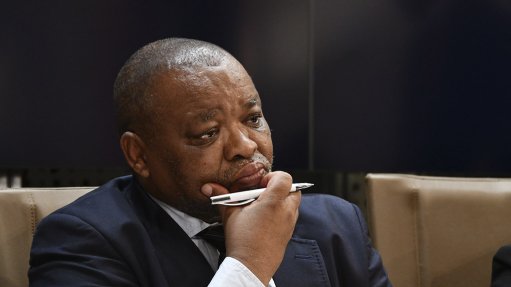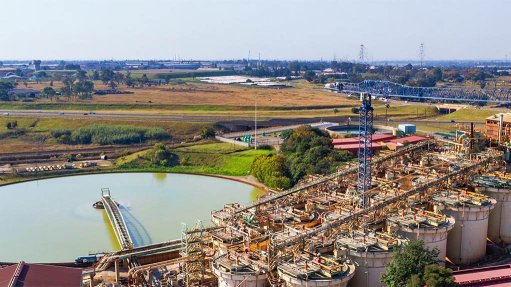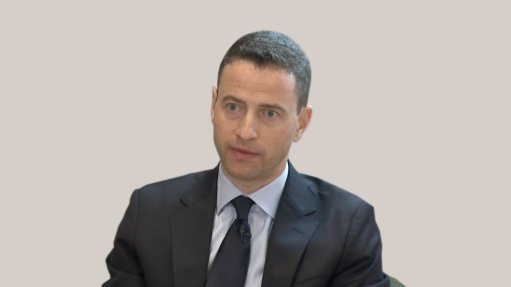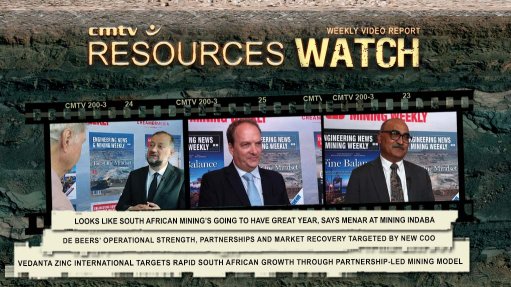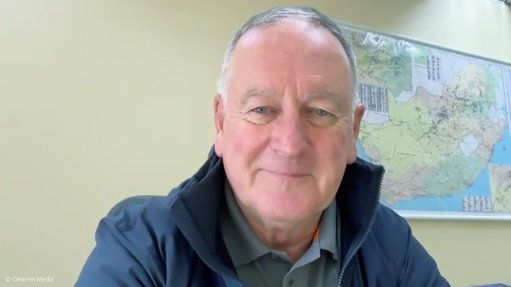CGS provides expert insights on junior mining exploration

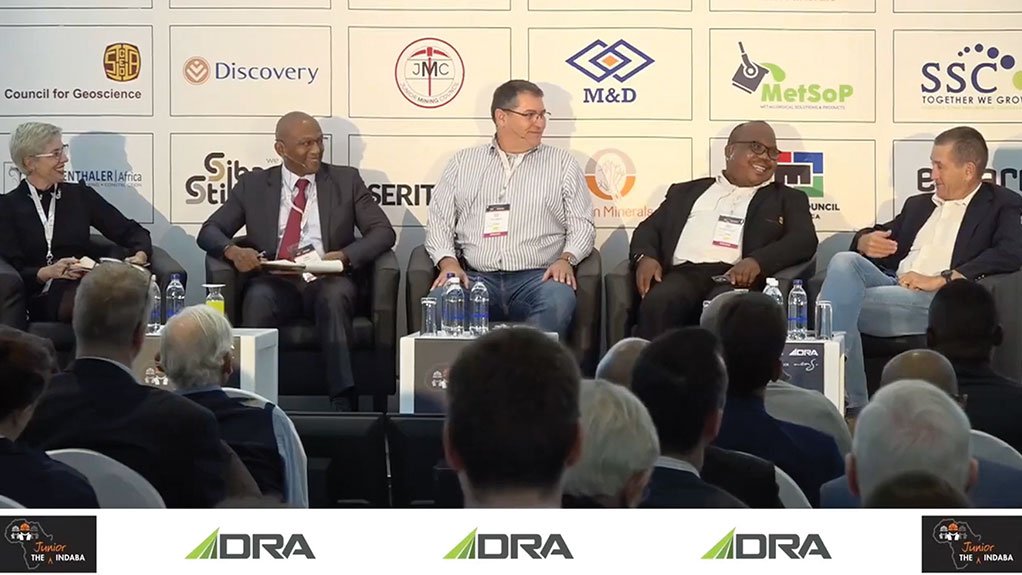
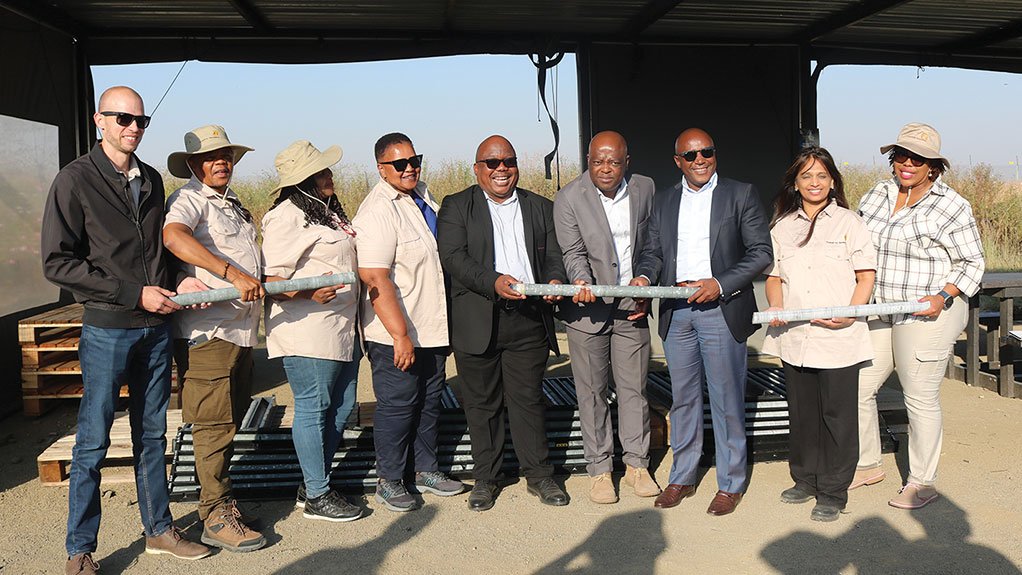
DRIVING EXPLORATION From left: NSDV director Lili Nupen, DMRE minerals and petroleum regulation DDG Tseliso Maqubela, Orion Minerals MD and CEO Errol Smart, CGS CEO Mosa Mabuza and Junior Indaba director Bernard Swanepoel
CGS board members and executive management holding the last core of the geological characterisation borehole in Leandra, Mpumalanga
Amid a mining industry plagued by challenges such as mining license application backlogs and host community unrest, the need for more action and collaboration in driving exploration in South Africa was the focal point for discussion throughout the first session of this year’s Junior Mining Indaba, held on May 21.
Using the yearly Junior Mining Indaba as a platform to discuss the challenges and opportunities for junior mining and exploration, the session, titled ‘What can be done to drive exploration in South Africa,’ honed in on the importance of having a united voice in driving exploration.
Council for Geoscience (CGS) CEO Mosa Mabuza was among the speakers on the panel, sharing valuable insights on the importance of geology in driving exploration forward, and CGS’ role in facilitating this process.
With extensive exploration experience in multiple regional jurisdictions spanning SADC, West Africa and Canada, Mabuza has been serving as CGS CEO since 2017, following his tenure as the Duputy Director General for Mineral Policy and Promotion in the Department of Mineral Resources and Energy (DMRE).
Other panellists included Orion Minerals MD and CEO Errol Smart, DMRE minerals and petroleum regulation deputy director-general Tseliso Maqubela and NSDV director Lili Nupen.
During the discussion, Mabuza pointed out that, at its inception, the CGS had to seek geoscience mapping programmes that were World Bank and IMF funded, owing to a lack of funding opportunities in the South African geology sector after the dawn of democracy in 1994.
Mabuza noted, however, that there has been an increase in exploration efforts across Africa over the last few decades, owing to an increase in deliberate investment in geology, thereby demonstrating the importance of geology in driving exploration efforts.
“The challenges with driving exploration do not necessarily only stem from regulatory certainty or uncertainty because we explore where the geology indicates. The sooner we get more geologists playing in the exploration space, the quicker the progress we will make,” Mabuza said.
His argument followed a discussion by Smart and Maqubela about the progress being made in driving local exploration efforts, as well as the role that a cadastral system can play in this.
Smart argued that more needs to be done to help facilitate junior mining developments, stressing the importance of regulatory certainty.
Responding to these concerns, Maqubela revealed that the DMRE has signed a service-level agreement for South Africa’s cadastral system.
“The news that we are moving forward is just the most incredible news because it can springboard us,” expressed Smart.
“It does seem as though there is progress, it’s not just talking, pen was put to paper,” said Nupen.
She added that, despite progress being made, junior miners still face challenges in driving exploration.
Providing a DMRE perspective, Maqubela explained that the department is experiencing an application backlog, with a bulk of applications geared towards mining permits in Mpumalanga.
The panellists also discussed South Africa’s brownfield exploration potential, with Smart pointing out that investors are more likely to invest in brownfields projects [which they see] as “low hanging fruits.”
While Mabuza agreed with Smart’s argument that brownfields projects are more likely to attract investment, he also posited that greenfield projects are the “lifeblood of our economy as a country.”
Mabuza highlighted that investing in collection, accumulation and processing of geological knowledge takes time and requires partnership with the private sector, noting that the department has an opportunity to quantify its work and, therefore, demonstrate the progress being made.
“We are available to partner with them and help them out of this morass,” said Mabuza.
INITIATIVES
As part of its integrated and multidisciplinary approach, one of CGS’ scientific focus areas includes minerals and energy.
The Geoscience for Minerals and Energy theme of the CGS benefits from a legacy of more than 110 years of geoscience data collection, information and knowledge.
As noted in its annual report for 2022/23, these legacy datasets, together with newly acquired data, are being integrated in innovative ways by using, for example, various kinds of machine learning protocols and targeted mineral system modelling.
In this sense, Mabuza noted during the discussion the important role of technology, such as satellites, in geological research and data collection, with the report explaining that the use of various satellite imagery forms a critical component of data integration.
“The fundamental rationale to this approach aims to increase South Africa’s exploration expenditure and to accelerate the minerals and energy contributions of the CGS towards the country’s socio-economic development,” the report notes.
Mabuza also noted that South Africa has an abundance of exploration potential in minerals such as graphite and lithium.
In this vein, CGS’s report notes that its Geoscience for Minerals and Energy theme looks at how South Africa’s geology and proven mineral potential are currently under-valued and, consequently, under-utilised, meaning that their contribution to the achievement of the nation’s socio-economic development goals is, therefore, currently “suboptimal.”
Further, the planning and development of CGS’s Geoscience for Minerals and Energy theme is also closely correlated with the numerous provincial and local embodiments of South Africa’s national development Vision 2030, including various provincial and district development models throughout the country.
CGS’s report notes that focussed target regions are selected and anticipated to have a direct impact on key development goals.
It explains that the minerals and energy systems that are being researched and developed are notable both at a local and international scale, relative to their supply, demand and beneficiation criteria.
These include key minerals that are deemed critical to future industrial and technological development.
Several key projects within the CGS’s Geoscience for Minerals and Energy theme include on- and offshore geoscience mapping; base metal mapping; precious metal mapping; the just transition; carbon capture, utilisation and storage (CCUS); national geophysics test sites and the national petrophysics and geochemical databases projects.
The CGS thus seeks to provide integrated, systematic and thematic maps and conduct research on the onshore and offshore geology of South Africa, as mandated to facilitate mineral, energy and agricultural development; contribute to the assessment and sustainable management of mineral, geohydrological and geoenvironmental resources; and support infrastructure development.
To this end, the report notes that the CGS provides necessary geoscientific and technical support in various DMRE-led initiatives, including the department’s exploration strategy.
Other objectives of the DMRE, supported by the CGS and with which its activities are aligned, include contributing to a just transition to a low-carbon economy.
The CGS’s contribution to the country’s energy security and just energy transition is founded on the numerous projects that constitute its Geoscience Technical Programme.
For example, the CGS is an implementing agency for the CCUS project, which tests carbon capture and utilisation in South Africa as a critical input in reaffirming the country’s commitment to clean energy and climate change mitigation.
Moreover, as part of its aims to drive sustainability and decarbonisation efforts, CGS has entered a memorandum of understanding to collaborate on carbon capture, use and storage initiatives to reduce greenhouse gas emissions, as previously reported in Mining Weekly respectively with diversified miners and key role players Exxaro Resources, Sasol, Arcelor Mittal, Development Bank of Southern Africa and the Net Zero Technology Centre.
Through the initiative, CGS aims to promote climate change adaptation and maximise social impact in support of South Africa’s national commitments, as stated in the Nationally Determined Contribution.
“We have an opportunity in South Africa to lead the pack in discovering Tier A and Tier 1 deposits that the world is looking for to achieve its NetZero objective,” Mabuza said at the Indaba.
“There has never been a greater time to be in exploration. The future of mining is junior,” he concluded.
Article Enquiry
Email Article
Save Article
Feedback
To advertise email advertising@creamermedia.co.za or click here
Press Office
Announcements
What's On
Subscribe to improve your user experience...
Option 1 (equivalent of R125 a month):
Receive a weekly copy of Creamer Media's Engineering News & Mining Weekly magazine
(print copy for those in South Africa and e-magazine for those outside of South Africa)
Receive daily email newsletters
Access to full search results
Access archive of magazine back copies
Access to Projects in Progress
Access to ONE Research Report of your choice in PDF format
Option 2 (equivalent of R375 a month):
All benefits from Option 1
PLUS
Access to Creamer Media's Research Channel Africa for ALL Research Reports, in PDF format, on various industrial and mining sectors
including Electricity; Water; Energy Transition; Hydrogen; Roads, Rail and Ports; Coal; Gold; Platinum; Battery Metals; etc.
Already a subscriber?
Forgotten your password?
Receive weekly copy of Creamer Media's Engineering News & Mining Weekly magazine (print copy for those in South Africa and e-magazine for those outside of South Africa)
➕
Recieve daily email newsletters
➕
Access to full search results
➕
Access archive of magazine back copies
➕
Access to Projects in Progress
➕
Access to ONE Research Report of your choice in PDF format
RESEARCH CHANNEL AFRICA
R4500 (equivalent of R375 a month)
SUBSCRIBEAll benefits from Option 1
➕
Access to Creamer Media's Research Channel Africa for ALL Research Reports on various industrial and mining sectors, in PDF format, including on:
Electricity
➕
Water
➕
Energy Transition
➕
Hydrogen
➕
Roads, Rail and Ports
➕
Coal
➕
Gold
➕
Platinum
➕
Battery Metals
➕
etc.
Receive all benefits from Option 1 or Option 2 delivered to numerous people at your company
➕
Multiple User names and Passwords for simultaneous log-ins
➕
Intranet integration access to all in your organisation












